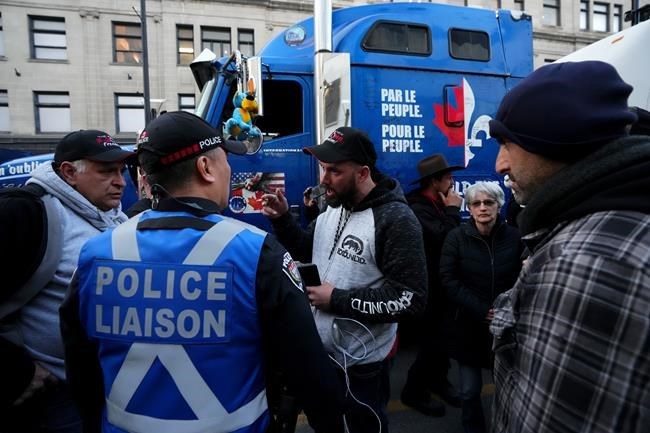OTTAWA — The judge in the trial of two "Freedom Convoy" protest organizers has ordered access to internal police documents so that she can determine whether they should be admitted as evidence.
Justice Heather Perkins-McVey said she must review unredacted copies of police communications to determine whether they are protected by solicitor-client privilege, and also whether they are relevant to assessing the credibility of police liaison witnesses.
Defence lawyers for Tamara Lich and Chris Barber, who are on trial for their role in the massive demonstration against COVID-19 public-health measures in early 2022, have asked to see emails that show what evidence police officers were asked to hand over as part of the case.
They also want to see any instructions given to officers about updating the software on their cellphones when the protest ended, as the judge said that update deleted messages between Barber and Ottawa police Const. Nicole Bach, considered a primary contact of Barber.
Const. Isabelle Cyr, another police liaison during the convoy who testified earlier in the trial, also lost communication records in an update to her work phone, said Perkins-McVey.Â
The judge said "it is very unusual" for two testifying officers to lose information relevant to a criminal case.Â
The defence had received only heavily redacted documents in response to their request, with the Crown and Ottawa police saying the only information omitted was irrelevant or protected by solicitor-client privilege.
Ottawa police Sgt. Jordan Blonde, who described himself as a "secondary" contact for Barber, was back on the stand on Tuesday answering prosecutors' questions.
But defence lawyers said they will not be able to complete their cross-examination until the judge rules on the admissibility of the internal police documents.
Crown prosecutors did not ask any questions related to Blonde's direct interactions with Barber.Â
On Tuesday, Blonde testified that some protestors were "hellbent" on getting arrested in their large vehicles or trucks. He said there was passive resistance to the police operation by members of the protesting group, as people refused to move out of the city's downtown.Â
Last week, Blonde had described "hostile" scenes leading up to a police operation to forcibly remove demonstrators after they had gridlocked downtown Ottawa for three weeks.
In earlier testimony on Oct. 19, Bach testified that Barber expressed early on that the demonstrations were getting "out of control," and that protesters wouldn't stop until they were acknowledged by the prime minister and federal government.
She said that within days of the protest's start, Barber expressed the convoy had "lost sight" of what it originally came to Ottawa to do.
Lich and Barber face multiple charges including mischief, counselling others to commit mischief and intimidation in relation to the protests.
The Crown seeks to prove the two high-profile organizers had influence over the actions of protesting crowds.
The trial has been frequently delayed by challenges around the admissibility of evidence.
It is expected to resume on Wednesday with more testimony from Blonde. The cross-examination of police liaison officers is also expected to begin.Â
This report by The Canadian Press was first published Oct. 31, 2023.Â
Liam Fox, The Canadian Press

